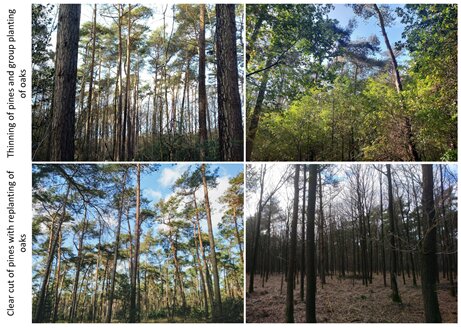Transformation of Scots pine forests to native ecosystems does not affect the ecosystem carbon stock
Scots pine forests, typical for many regions in Flanders, were planted in the past, mainly to supply the mining industry. Nowadays this particular economic value is no more, with the discontinuation of mining activities. Their ecological value is also considered low (exotic and evergreen). A common policy is therefore to modify or convert these forests into more diverse ecosystems, mixed or deciduous, with autochthonous-species. In a new study, Freke Van Damme (Global Change Ecology Centre, GCE, research group Plants and Ecosystems), investigated how this impacts the forest carbon storage.
Together with her co-authors, including multiple other GCE researchers and researchers from University of Gent, Freke investigated pairs of sites under a gradual transition (gradual cutting of pines and gradual growth of deciduous trees, such as pedunculate oak), as well as under a very abrupt modification (clear-cut of pine and planting of a new stand of oak). The main conclusion of the study was that, even under the intense management regime, C stocks in the ecosystem did not decrease over a period of 15 years. While conclusions can only be drawn for this study period, with longer-term follow-up needed to confirm, it is still a positive finding that the management shift, aimed to to increase ecological value and native biodiversity, does not result in a (temporary) significant loss of carbon at the ecosystem level.
